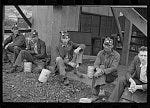Hi all,
Thank you for joining me for this week’s song, I am a Union Woman, by Aunt Molly Jackson.
If you’d like to hear the song before you read the background, I’ve included a YouTube video below the article.
Below, you’ll find my interpretation of the lyrics (written in italics). Comments and questions are welcome.
For Japanese students, vocabulary words in bold are provided in Japanese below.
You can read more about the background of the miners’ union movement in the U.S. here.
The Song
(769 words)
I am a Union Woman was written by Aunt Molly Jackson in 1931 - at least the lyrics were. The music comes from an old Baptist hymn.
Aunt Molly Jackson was born and grew up in Kentucky. She was an active member of the miners’ union in the 1930s. She had a guitar, and she wrote songs about the lives of the miners and their families.
Life as a miner - and a miner’s wife - was hard. The workers went down into the coal mines and worked long days in dangerous conditions for very little pay. At the end of their shift, they went to the boss to ask for their daily wages. Often, they received something called scrip, or little pieces of paper that the coal company had printed. It was not dollars and cents, and the only place that the miners could use the scrip was in the company store.
Most mining towns were very far from cities, and miners didn’t own cars or even horses and carts. It was difficult to travel outside the company town. The workers had to pay rent for the shacks or tents that the company provided. If a family member got sick, the company would call to the next town and ask a doctor to come. Of course, the doctor’s fees were deducted from the worker’s daily pay.
The company store was owned by the company, and there was no other store where workers could buy things. This meant that the company was in complete control of the prices of the items they sold. It also meant that the families were not able to afford to buy everything they needed to live. New clothes were too expensive when it was hard to buy enough food for your family. Vacations were for the bosses, not the workers.
When a baby was born into this environment, she or he had very little, if any, education to look forward to. Children also worked as assistants in the mines from the age of 5. It was next to impossible for anyone to break out of this cycle of birth, mine work, old age, and death. However, the company owners lived in good houses, and their children went to proper schools.
Because the mine owners controlled everything related to the workers’ lives, there was no other way to change the circumstances. The workers started to form unions. If they stuck together, maybe they would be strong enough to pressure the company bosses to raise their wages. Of course, the company did not want to make changes because this would affect the profits they made.
The miners went on strike. This meant that they did not work and they received no pay. They had nothing they could use to buy food at the company store. Aunt Molly Jackson took her guitar and her songs and went around Kentucky and other states, singing and telling people about the problems of the miners in the National Miners Union (NMU). She raised money to help the families back at the mines.
Because she was an outspoken supporter of the miners’ union, the company bosses did not like her. They didn’t want the unions to get stronger. They labeled her a Communist, a Russian Red.
During the 1930s, many Americans were afraid that the Communist revolution would spread to other countries, the U.S. in particular. A lot of the thinking and ideals of the Communist party, better pay for the workers for example, made sense to many members of unions at that time. Some members, but not all, were Communists. The company owners did not want to hire workers who were known to be Communists, and they found excuses to fire those who were. Sometimes, the company hired gun thugs, violent men who carried weapons, to scare the miners. Company owners were often close to law officials who somehow created evidence in order to arrest union members - framed up by the law.
In this song, Aunt Molly Jackson sings Bill Jackson, we can’t work you sir, your wife’s a Russian Red. Here, Molly Jackson’s husband was not able to find a job because Molly was well-known for her support of the unions. By association, the bosses labeled her a Russian Red (a Communist). According to a biography of Aunt Molly Jackson by Shelly Romalis, Pistol Packin’ Mama, Molly Jackson was not a Communist. The author explains that most of the miners where Jackson was from were quite conservative and had rather traditional religious values. After working with the larger union and understanding there was a difference in values, the NMU decided not to join with them.
Question:
In the song, Aunt Molly Jackson sings:
The bosses ride fine horses
While we walk in the mud
Their banner is the dollar sign
Ours is striped with blood
What do these last two lines mean? Leave your thoughts in the comments!
VOCABULARY
Baptist hymn 洗礼者賛美歌
coal mine 炭鉱
shack バラック
deduct 差し引かる
proper ちゃんとした、適切な
union 組合
outspoken 批判において/…について
Communist revolution 共産主義革命
ideals 理想
frame up たくらむ
by association 連想により
conservative 保守的
traditional 伝統的
religious 宗教的
values 価値観
Source:
Romalis, S. (2009). Pistol Packin’ mama: Aunt Molly Jackson and the politics of Folksong. University of Illinois Press.
Other songs about unions:






